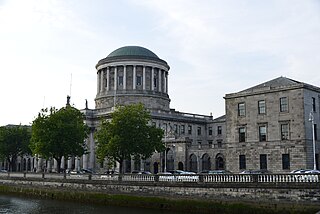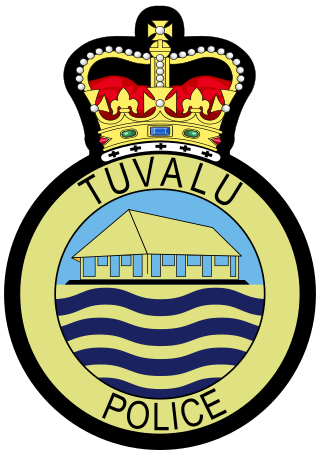The politics of Tuvalu takes place in a framework of a parliamentary representative democratic monarchy, whereby the monarch is the head of state, represented by the governor-general, while the prime minister is the head of government. Executive power is exercised by the government.

The law of the Republic of Ireland consists of constitutional, statutory, and common law. The highest law in the State is the Constitution of Ireland, from which all other law derives its authority. The Republic has a common-law legal system with a written constitution that provides for a parliamentary democracy based on the British parliamentary system, albeit with a popularly elected president, a separation of powers, a developed system of constitutional rights and judicial review of primary legislation.

The Supreme Court of Ireland is the highest judicial authority in Ireland. It is a court of final appeal and exercises, in conjunction with the Court of Appeal and the High Court, judicial review over Acts of the Oireachtas. The Supreme Court also has appellate jurisdiction to ensure compliance with the Constitution of Ireland by governmental bodies and private citizens. It sits in the Four Courts in Dublin.
The court system of Canada is made up of many courts differing in levels of legal superiority and separated by jurisdiction. In the courts, the judiciary interpret and apply the law of Canada. Some of the courts are federal in nature, while others are provincial or territorial.

The Parliament of Tuvalu is the unicameral national legislature of Tuvalu. The place at which the parliament sits is called the Vaiaku maneapa. The maneapa on each island is an open meeting place where the chiefs and elders deliberate and make decisions.

The New Zealand Bill of Rights Act 1990 is a statute of the Parliament of New Zealand part of New Zealand's uncodified constitution that sets out the rights and fundamental freedoms of anyone subject to New Zealand law as a bill of rights, and imposes a legal requirement on the attorney-general to provide a report to parliament whenever a bill is inconsistent with the Bill of Rights.

The Tuvalu Police Force is the national Police force of Tuvalu, it is headquartered in Funafuti and includes a Maritime Surveillance Unit, Customs, Prisons and Immigration. Police officers wear British style uniforms.
Nauruan law, since Nauru's independence from Australia in 1968, is derived primarily from English and Australian common law, though it also integrates indigenous customary law to a limited extent. Nauruan common law is founded mainly on statute law enacted by the Parliament of Nauru, and on precedents set by judicial interpretations of statutes, customs and prior precedents.

The Constitution of Samoa is a written constitution which is the supreme law in Samoa. It establishes Samoa as a parliamentary republic with a Westminster system and responsible government. It outlines the structure and powers of the Samoan government's three parts: the executive, legislature, and judiciary.
Tuvalu is a small island nation in the South Pacific, located North of Fiji and North West of Samoa. The population at the 2012 census was 10,837. Tuvalu has a written constitution which includes a statement of rights influenced by the United Nations Universal Declaration of Human Rights and the European Convention on Human Rights. While most human rights in Tuvalu are respected, areas of concern include women’s rights and freedom of belief, as well as diminishing access to human rights in the face of global warming. The latter has played a major role in the implementation of human rights actions in Tuvalu given its geographical vulnerability and scarce resources.

The judiciary of Namibia consists of a three-tiered set of courts, the Lower, High and Supreme Courts. Parallel to this structure there are traditional courts dealing with minor matters and applying customary law.

The judiciary of Solomon Islands is a branch of the Government of Solomon Islands that interprets and applies the laws of Solomon Islands, to ensure equal justice under law, and to provide a mechanism for dispute resolution. The legal system is derived from chapter VII, part II of the Constitution, adopted when the country became independent from the United Kingdom in 1978. The Constitution provided for the creation of a High Court, with original jurisdiction in civil and criminal cases, and a Court of Appeal. It also provided for the possibility of "subordinate courts", with no further specification (art.84).

The High Court of Tuvalu is the superior court of Tuvalu. It has unlimited original jurisdiction to determine the Law of Tuvalu and hears appeals from the lower courts.

The Court of Appeal of Tuvalu is established by sections 137 & 138 of the Constitution of Tuvalu to hear appeals from decisions of the High Court of Tuvalu and to determine the Law of Tuvalu. The administration of the court is set out in the Superior Courts Act (1987) and in the Court of Appeal Rules (2009). The Court of Appeal of Tuvalu determined appeals for the first time in 2009. Tomkins, Fisher and Paterson JJA were appointed to decide two cases:
The Constitution of Tuvalu states that it is “the supreme law of Tuvalu” and that “all other laws shall be interpreted and applied subject to this Constitution”; it sets out the Principles of the Bill of Rights and the Protection of the Fundamental Rights and Freedoms.

Crime in Tuvalu is not a significant social problem due to small population, geographic isolation, and low development.
The Falekaupule on each of the Islands of Tuvalu is the traditional assembly of elders or te sina o fenua. Under the Falekaupule Act (1997), the powers and functions of the Falekaupule are now shared with the Kaupule on each island, which is the executive arm of the Falekaupule, whose members are elected. The Kaupule has an elected president - pule o kaupule; an appointed treasurer - ofisa ten tupe; and is managed by a committee appointed by the Kaupule.

Simon Kofe is a Tuvaluan politician. He was appointed as the Minister for Justice, Communication & Foreign Affairs, in the cabinet of Kausea Natano following the 2019 Tuvaluan general election.

The judiciary of the Cook Islands is a system of courts that interprets and applies the laws of the Cook Islands. The judiciary has three levels: the Judicial Committee of the Privy Council serves as a final court of appeal. The Cook Islands Court of Appeal hears appeals from the High Court. The High Court of the Cook Islands deals with criminal and civil cases, as well as land cases under customary law. Minor crimes are heard in the High Court by Justices of the Peace.
The Land and Titles Court of Samoa is a specialist court dealing with Matai titles and customary land in Samoa.












